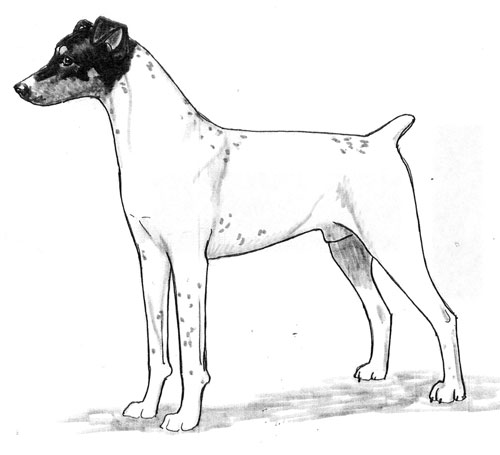Japanese Terrier
Terrier Group
The goals and purposes of this breed standard include: to furnish guidelines for breeders who wish to maintain the quality of their breed and to improve it; to advance this breed to a state of similarity throughout the world; and to act as a guide for judges.
Breeders and judges have the responsibility to avoid any conditions or exaggerations that are detrimental to the health, welfare, essence and soundness of this breed, and must take the responsibility to see that these are not perpetuated.
Any departure from the following should be considered a fault, and the seriousness with which the fault should be regarded should be in exact proportion to its degree and its effect upon the health and welfare of the dog and on the dog’s ability to perform its traditional work.
History
In the 17th Century, smooth-haired Fox Terriers were imported to Japan from the Netherlands. These dogs were bred with small pointers and native type dogs, and the Japanese Terrier eventually emerged, with type being set in the breed around 1930. The breed is kept mainly as a lap dog.
The Japanese Terrier was recognized by the United Kennel Club in 2006.
General Appearance
The Japanese Terrier is a short coated, small sized, clean cut dog, with a smart appearance and a compact outline.
Characteristics
Lively and cheerful.
Head
SKULL
Flat and moderately narrow, with a moderate stop.
MUZZLE
The same length as the skull, with a straight nasal bridge and thin, tight lips. The cheeks are lean and free from fullness.
TEETH
The Japanese Terrier has a complete set of evenly spaced, white teeth meeting in a scissors bite.
Faults: Slightly overshot or undershot bite.
Disqualifications: Severely overshot or undershot bite.
NOSE
Black.
EYES
Moderately sized, oval in shape, and dark in color.
EARS
Set on high, fairly small and thin, V-shaped, and folding forward. Rose ears are also permitted.
Neck
Moderately long, strong and tapering, with a clean throat.
Forequarters
The shoulders slope gently.
FORELEGS
Straight, with moderate bone.
Body
The body is square in proportion. The chest is deep, but not too broad, with well sprung ribs. The withers are high and the back is short and firm. The loin is slightly arched and powerful. The belly is well tucked up.
Hindquarters
The thighs are long. There is moderate angulation at the stifle and the hock. The rear pasterns are vertical.
Feet
Tight, with elastic pads, and hard nails that are preferably dark in color.
Tail
Moderately thin, and generally docked at the third or fourth joint.
Coat
Short, smooth, dense and glossy.
Disqualification: Long hair.
Color
Tricolor; white with black spots; white with black or tan markings on the body.
Height
Height at the withers is 12-13 inches.
Gait
Light and agile.
Disqualifications
(A dog with a Disqualification must not be considered for placement in a conformation event, and must be reported to UKC.)
Unilateral or bilateral cryptorchid.
Viciousness or extreme shyness.
Albinism.
Severely overshot or undershot bite.
Long hair.
The docking of tails and cropping of ears in America is legal and remains a personal choice. However, as an international registry, the United Kennel Club is aware that the practices of cropping and docking have been forbidden in some countries. In light of these developments, the United Kennel Club feels that no dog in any UKC event, including conformation, shall be penalized for a full tail or natural ears.

Looking for a Dog?
Find a dog that will fit your family.
Note: The breeders on this list are not endorsed by UKC.
©Copyright 2006, United Kennel Club
